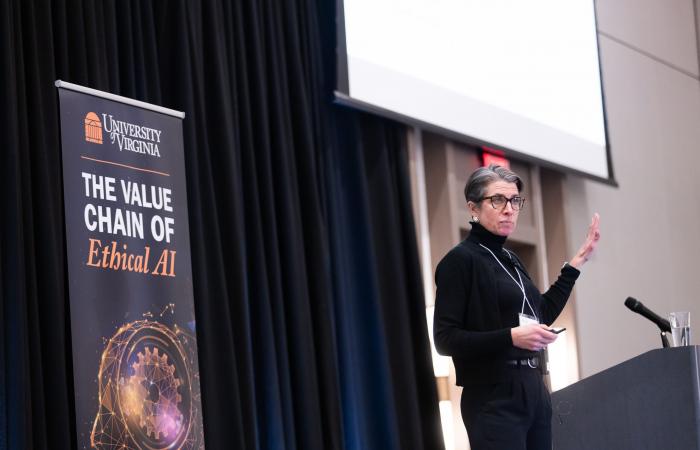The impressive growth of the artificial intelligence (AI) industry in recent years is met with excitement, wonder and a certain amount of concern. Promises of increased workplace efficiency and automation come with fears about job loss. The impressive power of generative AI platforms facilitates both sophisticated analysis and plagiarism.
As industries leveraging AI head into an uncertain future, the University of Virginia at Darden School of Business is working to understand the many implications of this potential and its dangers. At a recent conference organized by the LaCross Institute for Ethical AI in Business, speakers from academia, government and industry attempted to unravel this technological marvel that only comes around once. per generation, as well as the extraordinary ethical complications associated with it.
At the inaugural event, Dean Scott Beardsley, whose experience includes AI technology regulation and ethics, recalled an article he wrote in the 1990s titled “Broadband Changes Everything” . He highlighted that we are entering an era where AI could also transform everything, similar to the widespread adoption of high-speed internet.
One of the major societal challenges will be to guarantee responsible development of AI technologies, which is far from certain, especially given the many unknowns in this emerging field. “Technology advances quickly, and progress does not wait to establish certainty,” Beardsley said. “Many of us expect certainty, but I believe the only thing that is certain is uncertainty. I have reason to be optimistic in some areas, but I am also concerned.”
Beardsley said one of the challenges for individuals and organizations is to ensure that AI develops in ways that promote human well-being and flourishing, putting itself “in the service of humanity.” rather than the opposite. The conference theme, “The Ethical AI Value Chain,” served as a framework for leaders and researchers to explore the business and ethical issues related to each aspect of the development and application of AI. AI in business.
From ethical issues, through infrastructure, data, algorithms and applications, to impacts on people, ethical and commercial questions often emerge in tension and must be addressed for AI to deliver on its promise of ethical manner. Marc Ruggiano, director of the LaCross Institute, emphasized that “ethical AI is the result of a series of ethical considerations throughout the AI value chain.”
The conference was organized to explore each phase of this value chain by encouraging participants to set an agenda to guide their journey towards ethical AI in the years to come.
Introduction of liability
Kirsten Martin, a professor at the University of Notre Dame and an expert in technology ethics, discussed the ethical AI value chain by highlighting the “value-laden” decisions made at almost every stage of AI development and deployment. AI, a notion that contradicts the proclaimed objectivity of much AI data.
Tech companies often claim their algorithms are incomprehensible “black boxes,” trying to evade accountability by claiming the results are “objective, effective and accurate,” she said.
“The idea of increased efficiency is so prevalent in our assumptions about AI that we don’t even take the time to question what might be hidden behind it,” Martin said, noting that the enthusiasm surrounding AI AI could form a “bubble of misleading promises”. Responsible development of AI therefore requires real accountability on the part of those developing these technologies, particularly where companies exert influence over stakeholders.
The development of new technologies is often accompanied by an attempt by companies to evade responsibility for the negative implications of these technologies. “We should not view this as a stopping point when companies claim they are not responsible for negative impacts. Rather, it’s a normal part of the accountability process,” she explained.
According to Martin, a central question is who is considered a stakeholder in this AI landscape, taking into account many “constrained stakeholders”, i.e. those who have no choice in participate in the creation of company value.
The strategic value of AI
Darden professors Raj Venkatesan and Tom Davenport each gave lectures exploring the capabilities of AI and its implementation in business. Venkatesan, author of The AI Marketing Canvasoutlined examples of AI-related errors, as well as companies using these technologies to forge personalized connections with consumers, leading to increased engagement.
Their use of generative AI, fine-tuned by customer-specific data, will become a source of competitive advantage, Venkatesan said, taking into account a future where businesses will increasingly interact with “agentic” AI. an individual, rather than with the person themselves. Davenport, meanwhile, emphasized that despite the current excitement and apprehension, generative AI is generally still in the experimentation stage for businesses, with little deployment into production.
Smart companies looking to implement AI do so deliberately, following a well-defined process from strategy to use case, model development, deployment, and finally monitoring — a clear plan , far from “random acts of AI”. The conferences also included sessions dedicated to health, technology and talent management, taking a comprehensive approach to what AI means in 2024.
During a session on critical leadership skills for the future, Roshni Raveendhran highlighted that humans continue to excel at what she calls composite intelligence, or the ability to combine physical, emotional and perceptual intelligence in specific contexts. “AI cannot replace humans, but humans combined with AI could potentially replace those without this technology,” she said.
Darden faculty recognize that AI-centered education will be necessary to adapt to these new challenges and opportunities. Gabrielle Adams said the rapid evolution of AI would require a rethinking of learning and teaching methods.
Transform ideas into actions
Although this conference marked the first major event under the LaCross Institute umbrella, it builds on decades of commitment to ethical leadership at UVA and Darden. Established in 2024 through a generous gift from David LaCross (MBA ’78) and his wife Kathy, the Institute aims to integrate concepts such as business ethics and responsible leadership into the vast potential surrounding AI. For this, UVA leaders are aware, effort and deliberate actions will be necessary, concluding the conference, Professor Yael Grushka-Cockayne called on participants to prioritize the development of their knowledge in AI and their organizational capacities in the years to come.
Our editors use AI to help them deliver fresh items from trusted sources to our users. If you find any image or content that is inappropriate, please contact us via DMCA form and we will promptly remove it. / Our editors use AI to help them offer our readers fresh articles from reliable sources. If you find an image or content inappropriate, please contact us via the DMCA form and we’ll remove it promptly.
- -






